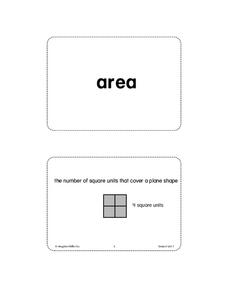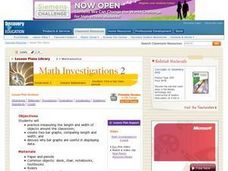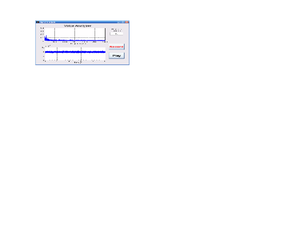Super Teacher Worksheets
Measuring With a Ruler
When it comes to using a ruler, how does your class measure up? Find out with this simple measurement worksheet that asks children to determine the lengths of common, everyday items to the nearest half inch.
National External Diploma Program Council
Measuring in Inches
Measure lines in inches using the most common tool of measurement: a ruler. Young mathematicians use a ruler to measure various lines. They also learn to round the the nearest quarter when measurements are not precise.
Houghton Mifflin Harcourt
Unit 7 Math Vocabulary Cards (Grade 2)
Reinforce math vocabulary instruction with a set of flash cards. Fifty-six cards offer either a bold-face word or a picture representation equipped with descriptive labels. Terms include centimeters, gallons, square units, and more!...
K-5 Math Teaching Resources
Elapsed Time Ruler Sample 1 x 4 Rulers
Who knew that you could measure time with a ruler? This great printable resource allows young mathematicians to visualize the hours of the day as they learn to calculate elapsed time.
Curated OER
Math Investigations 2
Young mathematicians practice measuring and graphing skills while working in groups to measure objects found in the classroom. Using their measurements, they create one bar graph displaying the lengths and another displaying the widths.
Curriculum Corner
Second Grade Summer Math Practice Book
Stop the summer lag with a set of second grade Common Core based math practice sheets. Learners fill in hundreds charts with missing numbers up to 1,000. They practice writing numbers in standard, expanded, and word form. Children also...
Wisconsin Online Resource Center
Oversized Inch
Each member of the class creates their own paper ruler. Using their ruler, kids walk around the room measuring the objects you've specified. Discuss how items should be measured to the 16th of an inch, the smallest unit on their ruler....
Curated OER
Planning a Garden Using a Grid
Third graders plan for a garden. In this garden planning lesson plan, 3rd graders investigate the use of a grid to accurately map out and plan for a vegetable garden. Students predict the space requirements for different vegetables.
Curated OER
Back To the Basics: Measurement
Lead the class in a review of the basic concepts and procedures involved in measuring length, weight, and volume. After whole group instruction, small groups and individuals practice measuring by completing a variety of fun activities...
NTTI
What Size Is It Anyway?
A fabulous plan on teaching basic concepts of measurement to young learners. Pupils use nonstandard units to measure length, practice using a ruler and a yardstick, compare the length of two objects, and perform estimations of length....
National External Diploma Program Council
Measuring in Metrics
Practice measuring skills with a 10-question worksheet that challenges scholars to measure lines using centimeters and inches.
Curated OER
Measuring Our Bodies
Second and third graders explore the size of their bodies. They use string to measure parts of their body in small groups. After measuring with string, students measure the string with a ruler. They then glue their string to a piece of...
Curated OER
Measuring Yourself Using the Metric System
Students measure using the metric system. In this geometry lesson, students solve problems using grams, meters and liters. They convert between the US units of measurements and the Metric System.
Curated OER
The Ruler, The King of Measurement
First graders learn how use a ruler to measure common items. In this measurement lesson, 1st graders examine the numerical markings on rulers and learn that each number stands for a unit of measure. They measure 5 classroom items after...
Curated OER
My Foot and the Standard Foot
Young mathematicians put one foot in front of the other as they learn how to measure length in an elementary math lesson. Using paper cutouts of their own feet, children measure classroom objects as they discover the importance of...
Education.com
Measure School Supplies
Ever wonder how long a pair of scissors are? Find out with this simple measuring activity in which pupils use the provided ruler to determine the length of four common classroom supplies.
K5 Learning
Mixed Practice Word Problems #8
Six questions make up a mixed practice learning exercise. Scholars use their knowledge of addition, subtraction, multiplication, money, perimeter, ounces, and pounds to solve word problems with numbers up to 66,000.
Mathed Up!
Reverse Percentages
Boost math skills and inspire scholars to show what they know with a six-page independent practice that focuses on proportional relationships and percents.
Mathed Up!
Exchange Rates
Eleven questions make up an eight-page practice exercise that focuses on how to compute exchange rates. Money used is the American dollar, Euro, and British pound.
Curated OER
Solving Problems Using Triangle Inequality Theorem
Sixth graders investigate triangles and the inequality theorem. They will collaborate in groups to determine the length of a longest side of a triangle. Then relate the size of the triangle to its angles using protractors, yard sticks,...
Illustrative Mathematics
Hand Span Measures
How long is your hand span? Young mathematicians measure their hand span from pinky tip to thumb tip using a centimeter ruler. After rounding to the nearest whole centimeter, learners plot their data on a line plot.
Arizona Department of Education
Introduction to Integers
Welcome to the backward world of negative numbers. This introductory lesson teaches young mathematicians that negative numbers are simply the opposite of positive numbers as they use number lines to plot and compare...
Teachers Network
A World of Symmetry: Math-Geometry
Define and identify the three basic forms of symmetry translation, rotation, and glides with your class. They cut out and arrange paper pattern blocks to illustrate symmetry, create a Cartesian graph, and design a rug with a symmetrical...
Curated OER
I Can Use a Worm to Count
Kindergarteners use worms, puppets or other props to practice counting to 100. First, they listen to a read aloud of Count Worms by Roger Hargeaves. A worm pattern is used to count to 100, with each segment of the worm...























